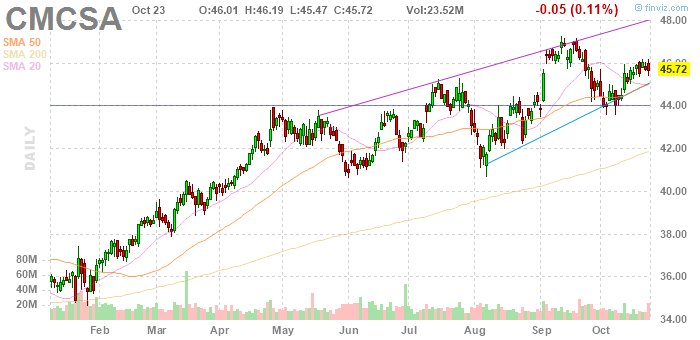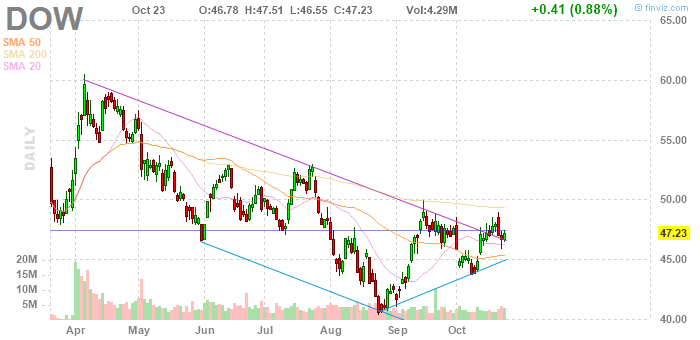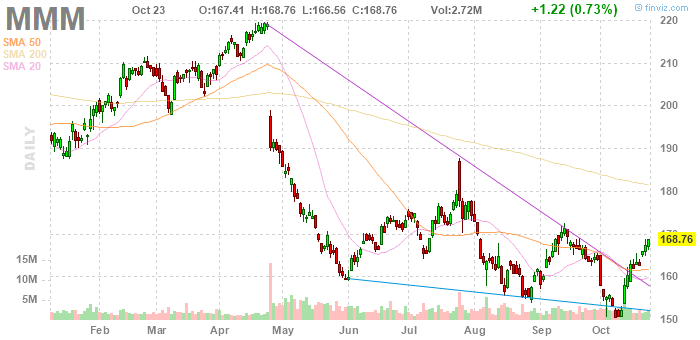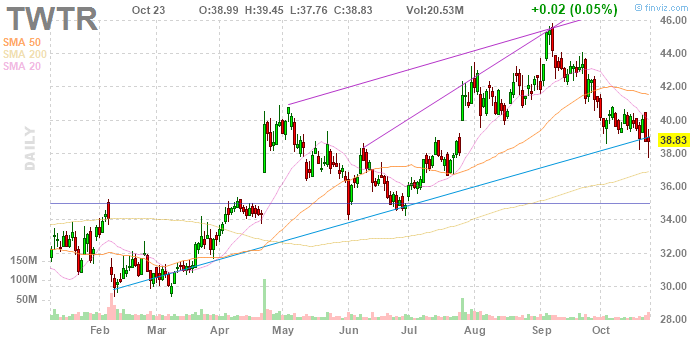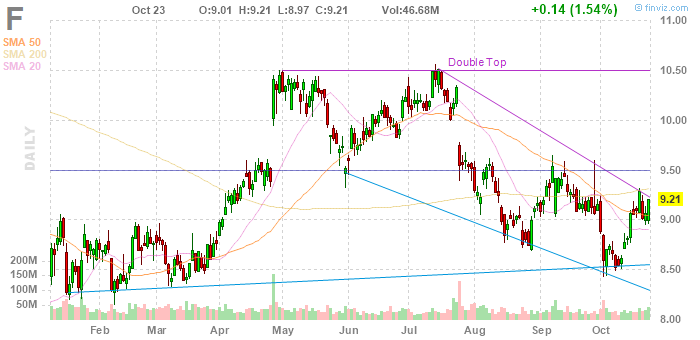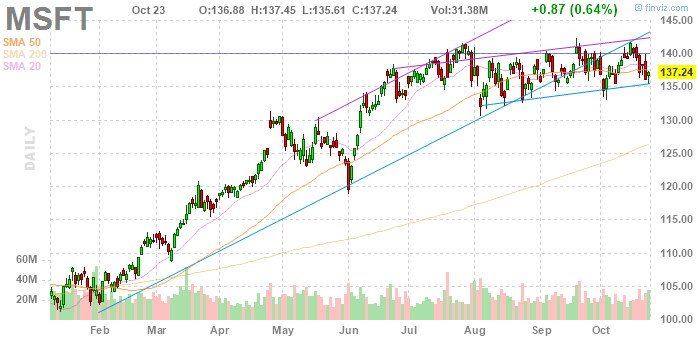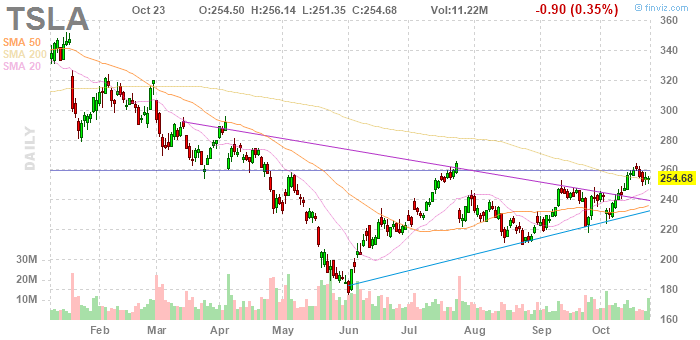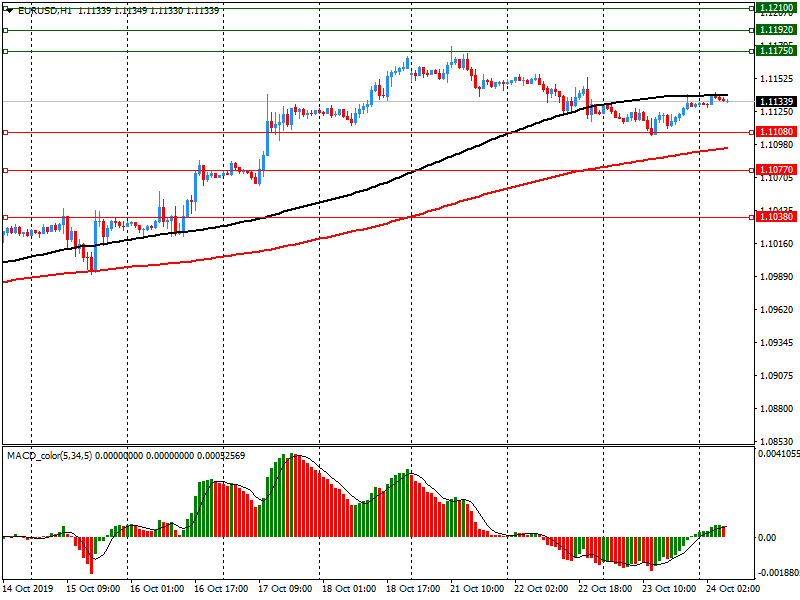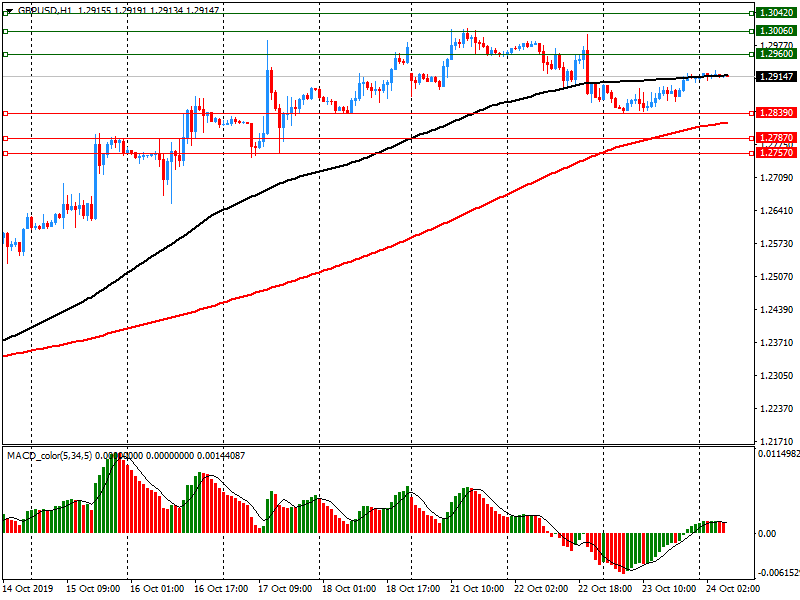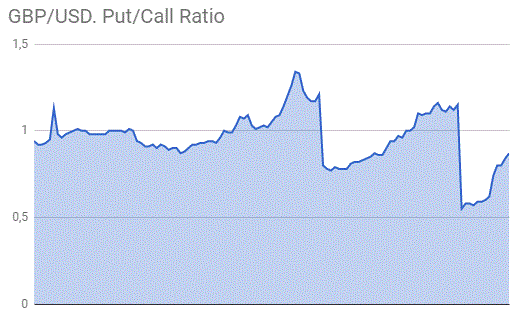- Analiza
- Novosti i instrumenti
- Vesti sa tržišta
Forex-novosti i prognoze od 24-10-2019
| Time | Country | Event | Period | Previous value | Forecast |
|---|---|---|---|---|---|
| 06:00 | Germany | Gfk Consumer Confidence Survey | November | 9.9 | 9.8 |
| 08:00 | Germany | IFO - Expectations | October | 90.8 | 91 |
| 08:00 | Germany | IFO - Current Assessment | October | 98.5 | 98 |
| 08:00 | Germany | IFO - Business Climate | October | 94.6 | 94.5 |
| 14:00 | U.S. | Reuters/Michigan Consumer Sentiment Index | October | 93.2 | 96 |
| 17:00 | U.S. | Baker Hughes Oil Rig Count | October | 713 |
The main US stock indices mainly increased, as investors analyzed the fresh reporting unit of American companies.
Tesla (TSLA) announced that it had adjusted earnings of $ 1.91 per share, which came as a surprise to analysts who forecast a loss of $ 0.28 per share. The company's revenue was slightly lower than Wall Street. Reduced costs and record deliveries of electric cars helped the automaker show profit. TSLA shares soared 17.77%.
Microsoft (MSFT) reported a profit of $ 1.38 per share, which was $ 0.14 higher than analysts. The company's revenue also exceeded market forecasts. Microsoft’s solid quarterly performance was partially driven by Azure’s cloud business, which grew 59% YoY. MSFT shares rose 1.91%.
Adjusted quarterly earnings of Dow Inc. (DOW) reached $ 0.91 per share, which was higher than the average forecast of analysts at $ 0.72. The company's quarterly revenues almost coincided with analysts' expectations, although sales decreased by 15.2% yoy due to lower prices for its products. DOW shares rose 4.61%.
On the contrary, disappointment for market participants was the results of Twitter (TWTR) and 3M (MMM). After the close of the trading session, quarterly reports are expected to be published by Amazon (AMZN), Intel (INTC) and Visa (V).
Investors also studied several important macro reports. The Commerce Department said a sharp drop in orders for transportation equipment contributed to a more significant than expected decline in orders for durable goods in the US in September. According to data, orders for durable goods fell 1.1% in September after rising by a revised 0.3% in August. Economists had expected orders for durable goods to decline by 0.8% compared with a 0.2% increase reported in the previous month. Excluding the sharp drop in orders for transportation equipment, orders for durable goods fell 0.3% in September after rising 0.3% in August.
Preliminary Markit PMIs indicated a slight increase in business activity in the US in October, supported by the fastest production expansion in six months. Service activity growth also accelerated, although growth rates in both sectors remained low. According to the report, the manufacturing index rose to 51.5 from 51.1 in September, which indicates that the business environment in the manufacturing sector continued to recover. The recorded rate of improvement was the fastest in six months, driven by stronger production growth, new orders and employment. At the same time, the index of business activity in the services sector rose to 51.0 from 50.9 in September, to a maximum since July.
Most of the DOW components completed trading in the red (21 of 30). Outsiders were 3M Co. (MMM; -3.69%). The biggest gainers were Dow Inc. (DOW; + 4.26%).
Most S&P sectors recorded an increase. The technological sector grew the most (+ 0.7%). The largest decline was shown in the raw materials sector (-0.4%).
At the time of closing:
Dow 26,805.06 -28.89 -0.11%
S&P 500 3,010.25 +5.73 +0.19%
Nasdaq 100 8,185.80 +66.00 +0.81%
| Time | Country | Event | Period | Previous value | Forecast |
|---|---|---|---|---|---|
| 06:00 | Germany | Gfk Consumer Confidence Survey | November | 9.9 | 9.8 |
| 08:00 | Germany | IFO - Expectations | October | 90.8 | 91 |
| 08:00 | Germany | IFO - Current Assessment | October | 98.5 | 98 |
| 08:00 | Germany | IFO - Business Climate | October | 94.6 | 94.5 |
| 14:00 | U.S. | Reuters/Michigan Consumer Sentiment Index | October | 93.2 | 96 |
| 17:00 | U.S. | Baker Hughes Oil Rig Count | October | 713 |
Analysts at Wells Fargo note that data released today showed that U.S. durable goods orders dropped 1.1%. According to their view, the strike at General Motors and the ongoing struggles at Boeing only partially held back durable goods orders in September. They see core orders remain in a trend decline and survey evidence suggests capital spending will remain weak during the fourth quarter.
- “Durable goods orders fell a larger-than-expected 1.1% in September. While some weakness can be tied to the United Auto Workers strike at General Motors (GM) and the ongoing struggles at Boeing, stripping out transportation, orders still declined 0.3%. More ominously, core orders—or nondefense excluding aircraft—fell 0.5% and remain in a trend decline.
- We wouldn’t be too surprised to see another drag from autos in both orders and production next month, as the GM strike only began half-way through September and is set to extend through the end of October.
- An unwind in inventories and a jump in shipments are likely once the jet receives the all-clear, and we expect this to show up in the national GDP accounts in the first half of 2020.
- Third-quarter GDP is due next week, and with September marking the third full month the 737 MAX has been grounded, it will be the first quarter Boeing’s struggles will be fully realized.
- The outlook for capital spending remains weak. Core orders continue to weaken, and remain higher than ISM readings would suggest, while capital spending plans among manufacturers continue to slide. Investment will likely remain under pressure in the months ahead.”
Arjen van Dijkhuizen, the senior economist at ABN AMRO, notes that China’s real GDP growth in Q3 came in marginally lower than expected, at 6.0% YoY (consensus/ABN AMRO expectation: 6.1%, Q2: 6.2%).
- “This reflects the lowest pace of growth in three decades and is at the bottom of the government’s growth target for 2019 (6.0-6.5%). Quarterly growth fell marginally to 1.5% qoq (Q2: 1.6%). The slowdown was driven by weakness in the industrial sectors.
- Growth of industry and construction slowed to 5.2% yoy (Q2: 5.6%). This was partially offset by a mild acceleration in services, from 7.0% yoy in Q2 to 7.2% in Q3. The weakness in industry fits within the global picture, as the escalation of the US-China trade/tech conflict has proven a serious drag for worldwide business confidence, manufacturing activity, investment and trade.
- All in all, these numbers are in line with our base scenario of an ongoing gradual slowdown. We expect annual growth to drop from 6.6% in 2018 to 6.2% in 2019 and for next year we expect growth to slide further and fall below 6%. Our annual growth forecast for 2020 is 5.8%, which is slightly below consensus (but consensus is moving our way).”
The U.S.
Commerce Department announced on Thursday that the sales of new single-family
homes fell 0.7 percent m-o-m to a seasonally adjusted annual rate of 701, 000
units in September.
Economists had
forecast the sales pace of 701,000 last month.
August’s sales
pace was revised down to 706,000 units from the originally reported 713,000
units.
According to
the report, new home sales in the South, the largest area, decreased 0.2 percent
m-o-m in September. Sales in the West declined 3.8 percent m-o-m and sales in
the Northeast dropped 2.8 percent m-o-m. Meanwhile, sales of new homes in the
West climbed 6.3 percent m-o-m.
In y-o-y terms,
new home sales recorded a 15.5 percent surge in September.
Preliminary
data released by IHS Markit on Thursday pointed to sustained modest rate of U.S.
private sector growth during October.
According to
the report, the Markit flash manufacturing purchasing manager's index (PMI)
came in at 51.5 in October, up from 51.1 in September. That was the highest
reading since April. Economists had expected the reading to drop to 50.7. A
reading above 50 signals an expansion in activity, while a reading below this
level signals a contraction. According to the report, the increase in the
headline PMI was due to stronger growth of output, new orders and employment.
Meanwhile, the
Markit flash services purchasing manager's index (PMI) edged up to 51.0 this
month, from 50.9 in the prior month. The latest reading was the highest one
since July. Economists had expected the reading to increase to 51.0. New
business intakes stagnated in October, which ended a ten-year period of
sustained expansion, the report said. In addition, employment decreased for the
second month running in October and the rate of decline in was the largest recorded
by the survey since December 2009.
Overall, IHS
Markit Flash U.S. Composite PMI Output Index came in at 51.2 in October, up
from 51.0 in September, signaling the sharpest increase in business activity since
July.
Commenting on
the flash PMI data, Chris Williamson, Chief Business Economist at HIS Markit, noted:
“The overall subdued picture reflects a spreading of economic weakness from
manufacturing to services, but encouragingly we are now seeing some signs of manufacturing
pulling out of its downturn, in part driven by a return to growth for exports
and improved sentiment about the year ahead, linked to hopes that trade war
tensions are starting to ease.”
Bill Diviney, the senior economist at ABN AMRO, expects that after the ECB for today’s Governing Council meeting the market focus will quickly shift to the Fed, with the October FOMC meeting due to conclude next Wednesday.
- “We have long expected a 25bp cut at this meeting (see here), and although market pricing has fluctuated considerably in recent weeks, OIS forwards are now 90% priced for a 25bp cut. Given the lack of strong pushback from Fed officials prior to the blackout period, we think it is unlikely the Committee would spring a surprise on markets at this stage, and so an October cut is probably a done deal.
- Could more resilient consumption put further rate cuts on the backburner? – The bigger question mark is over December, with OIS forwards pricing closer to 40% of an additional cut, down from 60-70% earlier in October.
- As a base case, we expect a further 25bp cut at this meeting. However, this view is predicated on weakness in the manufacturing sector feeding through to a slowdown in consumption. While we think the current strength in consumption is unsustainable, the resilience of consumer confidence in the face of slowing jobs growth suggests it may take somewhat longer than we expected for consumption to slow.
- With commentary from Fed officials sounding increasingly reluctant to ease – even more dovish members – this could well mean the December cut is pushed back to January, when a consumption slowdown becomes more visible in the data.”
U.S. stock-index futures rose on Thursday as solid quarterly reports from Microsoft (MSFT), Dow (DOW) and Tesla (TSLA) lifted investor sentiment, following disappointing results from several big companies in the previous session.
Global Stocks:
Index/commodity | Last | Today's Change, points | Today's Change, % |
Nikkei | 22,750.60 | +125.22 | +0.55% |
Hang Seng | 26,797.95 | +231.22 | +0.87% |
Shanghai | 2,940.92 | -0.6973 | -0.02% |
S&P/ASX | 6,693.60 | +20.50 | +0.31% |
FTSE | 7,329.75 | +69.01 | +0.95% |
CAC | 5,672.83 | +19.39 | +0.34% |
DAX | 12,864.40 | +66.21 | +0.52% |
Crude oil | $56.12 | +0.27% | |
Gold | $1,495.90 | +0.01% |
(company / ticker / price / change ($/%) / volume)
3M Co | MMM | 166.28 | -2.48(-1.47%) | 53313 |
ALTRIA GROUP INC. | MO | 46.9 | 0.15(0.32%) | 4043 |
Amazon.com Inc., NASDAQ | AMZN | 1,768.00 | 5.83(0.33%) | 25278 |
American Express Co | AXP | 116.95 | 0.46(0.39%) | 649 |
Apple Inc. | AAPL | 244.46 | 1.28(0.53%) | 205995 |
AT&T Inc | T | 37.83 | 0.09(0.24%) | 17941 |
Boeing Co | BA | 342.5 | 2.00(0.59%) | 17840 |
Caterpillar Inc | CAT | 135.06 | -0.28(-0.21%) | 8542 |
Chevron Corp | CVX | 117.99 | 0.01(0.01%) | 235 |
Cisco Systems Inc | CSCO | 47.29 | 0.24(0.51%) | 17443 |
Exxon Mobil Corp | XOM | 69.98 | 0.23(0.33%) | 4226 |
Facebook, Inc. | FB | 184.98 | -1.17(-0.63%) | 159160 |
FedEx Corporation, NYSE | FDX | 156.09 | 0.11(0.07%) | 260 |
Ford Motor Co. | F | 8.89 | -0.32(-3.47%) | 1163289 |
General Electric Co | GE | 9.12 | -0.02(-0.22%) | 27441 |
General Motors Company, NYSE | GM | 36.45 | -0.16(-0.44%) | 1983 |
Google Inc. | GOOG | 1,262.85 | 3.72(0.30%) | 1836 |
Hewlett-Packard Co. | HPQ | 17.14 | 0.02(0.12%) | 221 |
Home Depot Inc | HD | 234.99 | 0.32(0.14%) | 1313 |
Intel Corp | INTC | 52.05 | 0.33(0.64%) | 26130 |
International Business Machines Co... | IBM | 134.72 | 0.34(0.25%) | 4464 |
Johnson & Johnson | JNJ | 130.41 | 0.51(0.39%) | 10624 |
JPMorgan Chase and Co | JPM | 125.29 | 0.17(0.14%) | 3648 |
McDonald's Corp | MCD | 199.7 | 0.49(0.25%) | 6692 |
Merck & Co Inc | MRK | 83 | 0.13(0.16%) | 256 |
Microsoft Corp | MSFT | 138.85 | 1.61(1.17%) | 566048 |
Nike | NKE | 92.65 | 0.33(0.36%) | 4554 |
Pfizer Inc | PFE | 36.86 | 0.09(0.24%) | 2550 |
Procter & Gamble Co | PG | 123.42 | 0.42(0.34%) | 1249 |
Starbucks Corporation, NASDAQ | SBUX | 83.09 | 0.35(0.42%) | 5575 |
Tesla Motors, Inc., NASDAQ | TSLA | 301.18 | 46.50(18.26%) | 1657439 |
Twitter, Inc., NYSE | TWTR | 32.28 | -6.55(-16.87%) | 10426807 |
United Technologies Corp | UTX | 140.68 | 0.77(0.55%) | 3690 |
Verizon Communications Inc | VZ | 61 | 0.12(0.20%) | 18940 |
Visa | V | 173.7 | 2.38(1.39%) | 23309 |
Wal-Mart Stores Inc | WMT | 119.9 | 0.55(0.46%) | 554 |
Walt Disney Co | DIS | 131.6 | 0.47(0.36%) | 11253 |
Yandex N.V., NASDAQ | YNDX | 32.52 | 0.54(1.69%) | 67910 |
The U.S.
Commerce Department reported on Thursday that the durable goods orders fell 1.1
percent m-o-m in September, following a revised 0.3 percent m-o-m advance in August
(originally a 0.2 percent m-o-m gain). That was the largest monthly drop since
May.
Economists had
forecast a 0.8 percent m-o-m decrease.
According to
the report, orders for durable goods excluding transportation decreased 0.3
percent m-o-m, following a revised 0.3 percent m-o-m growth in August
(originally a 0.5 percent m-o-m climb) and exceeding market expectations of 0.2
percent m-o-m drop.
Orders for
non-defense capital goods excluding aircraft, a closely watched proxy for
business spending plans, fell 0.5 percent m-o-m in August, after a 0.6 percent
decline m-o-m in August (revised from a previously reported -0.4 percent
m-o-m). Economists had called for a 0.2 percent drop in core capital goods
orders in September.
Shipments of
these core capital goods decreased 0.7 percent m-o-m in September after a flat
m-o-m performance in the prior month (revised from a previously reported +0.3 percent
m-o-m).
- Services and construction show ongoing resilience but some moderation
- Risks to the economic outlook remain on the downside
- Headline inflation likely to decline further
- Underlying inflation to pick up over medium term
- Incoming data point to moderate but positive growth in H2
- Weak growth delays pass-through to inflation
- Ample degree of monetary policy is still necessary
- Fiscal stance is 'mildly expansionary' and providing some support
- Governments with fiscal space should act in a timely manner
U.S. weekly
jobless claims unexpectedly decline
The data from
the Labor Department revealed on Thursday the number of applications for
unemployment benefits unexpectedly fell last week, pointing to a still-tight
jobs market.
According to
the report, the initial claims for unemployment benefits decreased by 6,000 to
a seasonally adjusted 212,000 for the week ended October 19.
Economists had
expected 215,000 new claims last week.
Claims for the
prior week were revised upwardly to 218,000 from the initial estimate of 214,000.
Meanwhile, the
four-week moving average of claims decreased by 750 to 215,000 last week.
Comcast (CMCSA) reported Q3 FY 2019 earnings of $0.79 per share (versus $.0 65in Q3 FY 2018), beating analysts’ consensus estimate of $0.74.
The company’s quarterly revenues amounted to $26.827 bln (+21.2% y/y), generally in line with analysts’ consensus estimate of $26.775 bln.
CMCSA rose to $46.70 (+2.14%) in pre-market trading.
Dow (DOW) reported Q3 FY 2019 earnings of $0.91 per share (versus $1.34 in Q3 FY 2018), beating analysts’ consensus estimate of $0.72.
The company’s quarterly revenues amounted to $10.764 bln (-15.2% y/y), generally in line with analysts’ consensus estimate of $10.814 bln.
DOW rose to $48.83 (+3.39%) in pre-market trading.
3M (MMM) reported Q3 FY 2019 earnings of $2.72 per share (versus $2.58 in Q3 FY 2018), beating analysts’ consensus estimate of $2.52.
The company’s quarterly revenues amounted to $7.991 bln (-2.0% y/y), missing analysts’ consensus estimate of $8.197 bln.
The company also issued downside guidance for Q4 FY 2019, projecting GAAP EPS of $2.05-2.15 versus analysts’ consensus estimate of $2.37.
MMM fell to $166.21 (-1.51%) in pre-market trading.
The European
Central Bank (ECB) left its main refinancing rate unchanged at 0.00 percent on
Thursday, as expected.
Its interest
rates on the marginal lending facility and the deposit facility were also left
unchanged at 0.25 percent and -0.50 percent, respectively.
In its policy
statement, the ECB repeated the Governing Council expects its key interest
rates to remain at their present or lower levels until it has seen the
inflation outlook robustly converge to a level sufficiently close to, but
below, 2% within its projection horizon, and such convergence has been
consistently reflected in underlying inflation dynamics.
In addition,
the European regulator also confirmed that net purchases will be restarted
under the Governing Council’s asset purchase programme (APP) at a monthly pace
of €20 billion as from 1 November. The decision was made at the September meeting.
These purchases are expected to run for as long as necessary to reinforce the
accommodative impact of its policy rates, and to end shortly before it starts
raising the key ECB interest rates.
The Governing
Council also said it intends to continue reinvesting, in full, the principal
payments from maturing securities purchased under the APP for an extended
period of time past the date when it starts raising the key ECB interest rates,
and in any case for as long as necessary to maintain favourable liquidity
conditions and an ample degree of monetary accommodation.
- But will look for a fresh way to show its continued readiness to take action
Twitter (TWTR) reported Q3 FY 2019 earnings of $0.14 per share (versus $0.21 in Q3 FY 2018), missing analysts’ consensus estimate of $0.20.
The company’s quarterly revenues amounted to $0.824 bln (+8.7% y/y), missing analysts’ consensus estimate of $0.875 bln.
Twitter’s average monetizable daily active usage (mDAU) was 145 mln versus analysts’ consensus estimate of 142 mln and compared to 124 million in the same period of the previous year and 139 million in the previous quarter.
The company also issued downside guidance for Q4 FY 2019, projecting revenues of $940-1010 mln versus analysts’ consensus estimate of $1.05 bln
TWTR fell to $31.15 (-19.78%) in pre-market trading.
Ford Motor (F) reported Q3 FY 2019 earnings of $0.34 per share (versus $0.29 in Q3 FY 2018), beating analysts’ consensus estimate of $0.26.
The company’s quarterly revenues amounted to $33.931 bln (-2.1% y/y), generally in line with analysts’ consensus estimate of $33.876 bln.
The company also issued in-line guidance for FY 2019, projecting EPS of $1.20-1.32 versus analysts’ consensus estimate of $1.26 and its prior guidance of $1.20-1.35.
F fell to $8.83 (-4.13%) in pre-market trading.
Analysts at TD Securities are expecting the U.S. durable goods orders to post a 1.3% MoM decrease in September (mkt: -0.7%) largely on the back of a large decline in vehicle new orders.
- “More importantly, we expect both core orders series to also disappoint in September, with durables ex-transportation and core capex orders declining -0.2% and -0.8%, respectively. Separately, the Kansas City Fed index and the preliminary Markit survey should provide additional clues regarding the performance of the manufacturing sector in October.”
Microsoft (MSFT) reported Q1 FY 2020 earnings of $1.38 per share (versus $1.14 in Q1 FY 2019), beating analysts’ consensus estimate of $1.24.
The company’s quarterly revenues amounted to $33.055 bln (+13.7% y/y), beating analysts’ consensus estimate of $32.240 bln.
MSFT rose to $138.48 (+0.90%) in pre-market trading.
Tesla (TSLA) reported Q3 FY 2019 earnings of $1.91 per share (versus $2.90 in Q3 FY 2018), better than analysts’ consensus estimate of -$0.28.
The company’s quarterly revenues amounted to $6.303 bln (-7.6% y/y), missing analysts’ consensus estimate of $6.476 bln.
TSLA rose to $301.00 (+18.19%) in pre-market trading.
Nordea Markets analysts note that the Eurozone's PMIs improved only marginally this month, making up for a weak start of Q4, putting pressure on the ECB to step up easing.
- “The euro area PMIs picked up slightly in October. The composite index came out 50.2, just below consensus. The manufacturing index stood unchanged at the low level of 45.7, contrary to expectations of an improvement. The services index saw a small improvement to 51.8 from 51.6 last month.
- The PMIs indicate that growth in the euro area economy will remain subdued in Q4, but do not point to an economy-wide recession just yet. Our estimates suggest that the recent PMIs are in line with a mild recession scenario, which puts downside risks to our growth forecasts.
- We don’t expect the ECB to decide on any action in its meeting today, and think that the focus will be on Draghi’s legacy. However, the weak economy supports our view that the ECB will need to step up easing again in December, with another rate cut and an expansion of the asset purchase programme.
- Germany saw a slight improvement in its manufacturing PMI but remains at very low levels, as it landed at 41.9, just below expectations. The German manufacturing PMI gathers most attention due to its dramatic performance since the start of the year and its leading position in this slowdown. The services PMI had a small decrease to 51.2, contrary to expectations of an increase. This is a worrying sign that the service sector is being pulled down further, reflecting a broadening of the weakening in the German economy.
- The French economy is still relatively robust. Last month, France was the only country of the big four in which manufacturing still recorded growth according to the PMIs. France is keeping up this record and saw a small improvement in the manufacturing PMI to 50.5. The service sector is going strong and surprised to the upside with the services PMI rebounding to 52.9, almost making up for last month’s loss. Sentiment indicators and an extraordinarily strong H1 for manufacturing suggest that the manufacturing compared to other countries might come down still in the last months of this year.”
Analysts at ABN AMRO think that financial markets have largely priced out further action from the ECB for later this year and are pricing in some chance of only modest additional stimulus in 2020.
- “ECB-dated Eonia swaps suggest investors expect the central bank to remain on hold through the end of this year, while 3-month Euribor futures even price in somewhat higher rates. The latter most likely reflects expectations that the ECB’s tiering system (where around EUR 800bn of reserves will no longer be charged at the deposit rate) may put upward pressure on interbank rates. Meanwhile, Eonia swaps and Euribor futures are pricing in around a 60% chance of a 10bp cut in the deposit rate next year.
- The consensus of economists polled by Bloomberg also expect the deposit rate to remain unchanged this year, while one additional 10bp reduction in June of next year is expected.
- Although market expectations are consistent with the ECB’s current views and guidance, we take a different view. In particular, we think that the ECB is too optimistic on the macro outlook as well as on the effects of its September stimulus package. As such, we maintain the view that the ECB will cut its deposit rate by 10bp in December of this year before stepping up the pace of net asset purchases at the March meeting (to EUR 40bn a month from April). The combination of macro downgrades and additional ECB stimulus should fuel a renewed rally in government bond markets over the coming months.”
- Would ask UK to send commissioner if Britain is still on EU after October 31
Italy's 2020 draft budget does not imply a significant deviation from EU rules, the government said in a letter sent to the European Union Commission on Thursday.
Italy's fiscal plan assumes a rise in the structural deficit, the measure excluding business cycle swings and one-off expenditure and revenue, of 0.1% of GDP. Under EU rules this deficit should fall 0.6% of GDP.
"The projected change in the structural balance in 2020 would not constitute a significant deviation", Economy Minister Roberto Gualtieri said in response to EU letter asking for clarification over its budget for next year.
Krishen Rangasamy, analyst at National Bank Financial, notes that the US labour force participation rate has declined sharply since 2000, hurting economic growth in the process.
“Over the years, economists have put forward various possible explanations for this phenomenon including retirement of baby boomers, increasing college attendance among the youth, inadequate child-care policies, higher incarceration rates and poor health. Since 2014, the overall labour force participation rate has stabilized near 63%, coinciding with improving health outcomes. According to the 2018 Annual Statistical Report on the Social Security Disability Insurance Program the number of disabled workers, which peaked at almost 9 million back in 2014, has fallen for four consecutive years. Part of decline can be attributed to workers under the age of 50 taking pain medication. Re-entry into the labour force of previously disabled workers explains in part the observed stabilization in prime-age participation. While positive for economic growth, rising participation also means it will be harder for the jobless rate to decline much further.”
According to Rabobank analysts, Mario Draghi’s final meeting as President of the ECB today should be a relatively uneventful policy-wise.
“A comprehensive policy package was announced only last month and this has yet to be implemented fully (recall that both net asset purchases and the tiered remuneration of excess reserves will only start at the end of this month). Nonetheless, President Draghi’s farewell may not be the party he was hoping for. The ECB’s latest policy decision caused quite some division in the Council. Moreover, the ECB President is waving goodbye against an economic backdrop that is not as bright as he would have liked to see it as he leaves office. If the incoming data remain weak, incoming President Lagarde may have to step in Draghi’s footsteps and lower the ECB’s deposit rate again at her first policy meeting in December. But we do note that division in the Council has increased the likelihood that the next cut will be delayed into 2020.”
Deutsche Bank analysts suggest that the market highlight today comes from the ECB, in what will be President Mario Draghi’s last Governing Council meeting before Christine Lagarde takes over on 1 November.
“His final choice of tie colour will be of great interest to all. Maybe it will be a novelty bow-tie. Over his 8 years in charge, the Euro Area has emerged from its sovereign debt crisis and seen unemployment fall to 7.4%, its lowest since May 2008. However, inflation has proved stubbornly difficult to return to target (averaging 1.19% over the period), standing at just +0.8% in September, while five-year forward five-year inflation swaps stand at just 1.202%, so not exactly a vote of confidence from the markets that they expect the ECB to get inflation back up again anytime soon. Although Draghi’s term has another week to go we thought we’d mark his last press conference with a look at the performance of our usual sweep of key global assets under his 8 year tenure.”
The number of new mortgages approved by British banks hit a six-month low in September, that adds to signs the housing market is slowing again ahead of the October Brexit deadline.
Industry body UK Finance said banks approved 42,310 loans for home purchase in September, compared with 42,527 in August, according to seasonally-adjusted data. However, the number of approvals for remortgaging rose to the highest level since November 2017 at 32,649.
UK Finance said annual growth in consumer credit rose to a 19-month high of 4.5% from +4.4% y/y in August, driven by personal loans and overdrafts rather than credit card lending. Credit card lending is seen slowing to +3.0% y/y - the weakest rise since November 2014.
According to the latest flash PMI data, the Eurozone economy remained close to stagnation at the start of the fourth quarter, with demand for goods and services falling for a second successive month. A further steep decline in manufacturing output was accompanied by one of the weakest service sector expansions since 2014. Future expectations sank to the gloomiest since 2013 and jobs growth hit the lowest since 2014. Selling price inflation meanwhile stuck at a near three-year low amid muted cost pressures. By country, an improved performance in France helped keep the eurozone out of contraction, alongside a mild easing in the rate of decline in Germany. However, the rest of the region slowed closer to stagnation.
At just 50.2 in October, the ‘flash’ IHS Markit Eurozone Composite PMI rose only marginally from 50.1 in September to signal the second smallest expansion of output across manufacturing and services since the current upturn began in July 2013. New orders for goods and services fell for a second month in a row, the rate of decline easing slightly but nevertheless adding to the worst picture of demand since mid-2013 in recent months.
Service sector growth picked up slightly compared to September but continued to run at one of the weakest rates since late-2014 as new business inflows slipped closer to stagnation. Future expectations for output meanwhile fell to the lowest since May 2013, prompting companies to take an increasingly cautious approach to hiring. Jobs growth consequently sank to the lowest since December 2014, led by the steepest loss of manufacturing jobs since the start of 2013.
The German economy remained in contraction at the start of the fourth quarter, according to the October flash PMI data from IHS Markit. The Flash Germany Composite Output Index – which is based on approximately 85% of usual monthly replies – registered 48.6 in October, little-changed from September’s near seven-year low of 48.5 and below the 50 no-change level for the second month in a row. Moreover, the survey showed employment falling for the first time in six years.
The Flash Germany Manufacturing PMI meanwhile also remained firmly in contraction territory at 41.9 in October. This represented a marginal improvement from September’s ten-year low of 41.7, as rates of decline in factory output and new orders eased slightly. However, weighing on the index were faster decreases in employment and stocks of purchases, alongside a more marked improvement in supplier delivery times. Latest data showed the rate of growth of service sector business activity easing to only a modest pace that was the weakest for over three years. Behind this was a sustained decline of demand in the sector, with inflows of services new business falling for the second month in a row and at the quickest rate since June 2013.
Business sentiment meanwhile turned increasingly negative, with expectations falling to the lowest since November 2012. Driving this was a marked deterioration in confidence across the service sector, where for the first time in almost seven years the number of firms expecting activity to fall over the coming year exceeded those anticipating an increase. Manufacturers remained strongly pessimistic about the outlook, though expectations rebounded further from August’s record low to the highest since June.
Business decision-makers in Asia Pacific cite the prospect of a global recession and the impact of trade tariffs as the biggest risks for their companies in the next six to 12 months, according to a survey from J.P. Morgan.
Around 30% of chief financial officers and group treasurers in the region belonging to 130 global companies said they felt a potential global recession posed the biggest risk to their businesses in a poll conducted at the 2019 J.P. Morgan Asia Pacific CFO and Treasurers Forum in Shanghai.
The impact of global trade tariffs was a top concern for about 27% of the respondents, while 24% said they were worried about a slowdown in emerging markets, 10% revealed cyber threats were a primary worry and 9% pointed to Brexit and the future of the eurozone.
“The concerns over the impact of headwinds in the global macro environment are front and center in the minds of the top CFOs and treasurers of global corporations,” Oliver Brinkmann, head of corporate banking for Asia Pacific at J.P. Morgan, said in a statement.
“While J.P. Morgan’s view is not for a recession, growth is expected to slow in the coming quarters, with global growth for 2019 forecast at 2.7 percent and dipping to 2.5 percent in 2020,” he wrote.
British employers plan to scale back their pay rises for staff next year, an industry survey showed, suggesting overall earnings growth is likely to slow from its current 11-year high.
Human resources data company XpertHR said the 123 private-sector employers it surveyed expect to offer a median 2.1% annual pay settlement between now and the end of August 2020, compared with an average 2.5% over the past 12 months.
"While the strong labour market continues to put pressure on employers to raise wages, other costs and an uncertain outlook could well mean lower pay rises for employees," XpertHR analyst Sheila Attwood said.
Average wage growth - which usually exceeds pay settlements, due to the effect of promotions and job changes - rose to an 11-year high of 3.9% according to official figures for the three months to July, before slowing slightly in August. Unemployment is also close to its lowest since the mid-1970s at 3.9%, but there was an unexpectedly sharp fall in hiring in the three months to August, raising concerns that the slowdown in the rest of the economy is spreading to the job market.
The Bank of Japan warned the country’s banking system is becoming increasingly fragile as financial institutions boost risky lending and investment in an environment of prolonged ultra-low interest rates.
“Credit costs remain low but have recently started to rise, particularly for regional financial institutions,” the BOJ said in a semi-annual report analyzing Japan’s banking system.
Regional banks have been actively taking risks via lending and investment as prolonged ultra-low interest rates and a dwindling population prod them to seek higher returns, it said.
“As they have not been able to secure adequate returns relative to the risks involved, their capital adequacy ratios have continued to decline moderately,” the report said.
“Should this situation persist, loss-absorbing capacity in the event of stress would decrease, intensifying downward pressure on the economy by weakening financial intermediation,” it said.
Major financial institutions have also expanded overseas lending, which make Japan’s banking system more susceptible to the impact of overseas economic conditions, the report said.
TD Securities analysts suggest that ahead of todays ECB meeting, we have the flash PMIs for October and will be a key economic release for the day.
“We'll be keeping a close eye on German manufacturing, which took a steep dive lower last month after stabilising in August, with some very weak survey details. Given that new orders fell at their quickest rate since April 2009, we think there's likely further downside to come and look for the PMI to fall to 41.0 (mkt 42.0), a new post-financial crisis low. For France, we think that the services PMI likely held fairly steady just above the 50 mark, with a reading of 51.0 in October. For the ECB meeting, we look for a fairly uneventful meeting, with more focus on celebrating Draghi's 8 years as ECB President before his term ends at the end of the month. However, we do expect a dovish lean, given the concern about inflation expectations, which we don't think are likely to show any real signs of improvement for Q4, as well as softer growth trends, which we think will lead to forecast downgrades in December.”
EUR/USD
Resistance levels (open interest**, contracts)
$1.1210 (2940)
$1.1192 (3629)
$1.1175 (2236)
Price at time of writing this review: $1.1134
Support levels (open interest**, contracts):
$1.1108 (1772)
$1.1077 (2371)
$1.1038 (2502)
Comments:
- Overall open interest on the CALL options and PUT options with the expiration date November, 8 is 72524 contracts (according to data from October, 23) with the maximum number of contracts with strike price $1,1000 (4024);
GBP/USD
Resistance levels (open interest**, contracts)
$1.3042 (2508)
$1.3006 (1945)
$1.2960 (1810)
Price at time of writing this review: $1.2915
Support levels (open interest**, contracts):
$1.2839 (261)
$1.2787 (215)
$1.2757 (150)
Comments:
- Overall open interest on the CALL options with the expiration date November, 8 is 32404 contracts, with the maximum number of contracts with strike price $1,3200 (3774);
- Overall open interest on the PUT options with the expiration date November, 8 is 28209 contracts, with the maximum number of contracts with strike price $1,2100 (3173);
- The ratio of PUT/CALL was 0.87 versus 0.84 from the previous trading day according to data from October, 23
* - The Chicago Mercantile Exchange bulletin (CME) is used for the calculation.
** - Open interest takes into account the total number of option contracts that are open at the moment.
| Raw materials | Closed | Change, % |
|---|---|---|
| Brent | 60.73 | 2.39 |
| WTI | 55.82 | 2.93 |
| Silver | 17.52 | 0.11 |
| Gold | 1491.634 | 0.27 |
| Palladium | 1740 | -0.79 |
| Index | Change, points | Closed | Change, % |
|---|---|---|---|
| NIKKEI 225 | 76.48 | 22625.38 | 0.34 |
| Hang Seng | -219.47 | 26566.73 | -0.82 |
| KOSPI | -8.24 | 2080.62 | -0.39 |
| ASX 200 | 0.9 | 6673.1 | 0.01 |
| FTSE 100 | 48.25 | 7260.74 | 0.67 |
| DAX | 43.5 | 12798.19 | 0.34 |
| Dow Jones | 45.85 | 26833.95 | 0.17 |
| S&P 500 | 8.53 | 3004.52 | 0.28 |
| NASDAQ Composite | 15.49 | 8119.79 | 0.19 |
| Pare | Closed | Change, % |
|---|---|---|
| AUDUSD | 0.68517 | -0 |
| EURJPY | 120.937 | 0.22 |
| EURUSD | 1.1131 | 0.06 |
| GBPJPY | 140.28 | 0.49 |
| GBPUSD | 1.29112 | 0.34 |
| NZDUSD | 0.64201 | 0.26 |
| USDCAD | 1.3071 | -0.16 |
| USDCHF | 0.99033 | 0.1 |
| USDJPY | 108.639 | 0.15 |
© 2000-2026. Sva prava zaštićena.
Sajt je vlasništvo kompanije Teletrade D.J. LLC 2351 LLC 2022 (Euro House, Richmond Hill Road, Kingstown, VC0100, St. Vincent and the Grenadines).
Svi podaci koji se nalaze na sajtu ne predstavljaju osnovu za donošenje investicionih odluka, već su informativnog karaktera.
The company does not serve or provide services to customers who are residents of the US, Canada, Iran, The Democratic People's Republic of Korea, Yemen and FATF blacklisted countries.
Izvršenje trgovinskih operacija sa finansijskim instrumentima upotrebom marginalne trgovine pruža velike mogućnosti i omogućava investitorima ostvarivanje visokih prihoda. Međutim, takav vid trgovine povezan je sa potencijalno visokim nivoom rizika od gubitka sredstava. Проведение торговых операций на финанcовых рынках c маржинальными финанcовыми инcтрументами открывает широкие возможноcти, и позволяет инвеcторам, готовым пойти на риcк, получать выcокую прибыль, но при этом неcет в cебе потенциально выcокий уровень риcка получения убытков. Iz tog razloga je pre započinjanja trgovine potrebno odlučiti o izboru odgovarajuće investicione strategije, uzimajući u obzir raspoložive resurse.
Upotreba informacija: U slučaju potpunog ili delimičnog preuzimanja i daljeg korišćenja materijala koji se nalazi na sajtu, potrebno je navesti link odgovarajuće stranice na sajtu kompanije TeleTrade-a kao izvora informacija. Upotreba materijala na internetu mora biti praćena hiper linkom do web stranice teletrade.org. Automatski uvoz materijala i informacija sa stranice je zabranjen.
Ako imate bilo kakvih pitanja, obratite nam se pr@teletrade.global.

